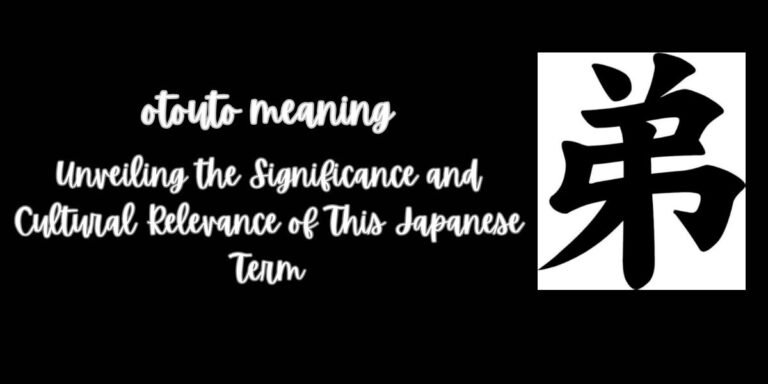The Japanese language is rich with subtle nuances and a deep cultural context that can make translation tricky for those unfamiliar with it. One such term that frequently comes up in conversations about familial relationships is “otouto” (弟). But what does otouto meaning, and how is it used in everyday Japanese life?
In this article, we will delve into the exact meaning of “otouto,” its cultural context, and how it relates to other familial terms in the Japanese language. Whether you’re learning Japanese or simply curious about its meanings, this guide will give you all the information you need.
What is the Meaning of “Otouto”?
The term “otouto” (弟) translates directly to “younger brother” in English. It is a specific term used to refer to one’s younger sibling of the male gender. The word is composed of two kanji characters: 弟 (otouto), which means “younger brother,” and the second part, 子 (ko), which is used in other terms to mean “child” or “offspring.” In the context of the family, the term “otouto” specifically signifies a brother who is younger than the speaker.
How is “Otouto” Used in Sentences?
When speaking about one’s younger brother, the term “otouto” is often used in casual, familial conversations. For instance:
- 私の弟はゲームが好きです。
(Watashi no otouto wa geemu ga suki desu.)
“My younger brother likes video games.”
In formal contexts, such as when speaking to someone outside your family or to someone of higher social standing, you might use a more respectful form of the term, like 弟さん (otouto-san). This added honorific elevates the politeness level of the term.
The Importance of “Otouto” in Japanese Culture
The concept of siblings holds a unique place in Japanese culture, with distinct terms to describe older and younger brothers and sisters. Japan’s emphasis on respect and hierarchy influences how individuals speak about their family members. The way one refers to their younger brother, for example, can differ based on the context and the age gap between the siblings.
For example, the word 兄 (ani) refers to an older brother, whereas 姉 (ane) refers to an older sister. In contrast, 弟 (otouto) and 妹 (imouto) are used for younger brothers and younger sisters, respectively. This distinction reflects the strong cultural importance placed on the role each family member plays, as well as the degree of respect and responsibility expected from each sibling.
“Otouto” vs. “Ani”: Understanding the Difference
In Japanese, the relationship between an older and a younger sibling is not just biological, but also deeply rooted in the cultural values of hierarchy and respect. To better understand the usage of “otouto,” it’s essential to compare it with the term for an older brother, “ani” (兄). Here’s a simple comparison of the two:
| Term | Kanji | Pronunciation | Meaning | Context | Honorific Usage |
| Younger Brother | 弟 (otouto) | Otouto | Younger male sibling | Used by someone older, or a family member speaking about their younger brother | 弟さん (otouto-san) when showing respect |
| Older Brother | 兄 (ani) | Ani | Older male sibling | Used when referring to one’s older brother | 兄さん (ani-san) when showing respect |
Both terms are used based on familial hierarchy, and they help express the nuances of respect in family relationships. In formal or respectful contexts, the use of honorifics is key.
“Otouto” in Media and Pop Culture
Japanese media, including anime, television dramas, and films, often portray sibling relationships with great emphasis, and “otouto” is a term commonly heard in these contexts. Younger brothers in anime are often depicted as energetic, mischievous, and caring. In these stories, the term “otouto” is frequently used to express both affection and a sense of responsibility that older siblings feel for their younger ones.
One popular example can be seen in the anime “My Youth Romantic Comedy Is Wrong, As I Expected” (also known as “Oregairu”), where the main character Hachiman has a younger brother named Komachi, who frequently calls him by his nickname “Hikki,” a sign of affection. In this context, the usage of “otouto” is a subtle but significant representation of the bond between siblings.
The Evolution of “Otouto” in Contemporary Japan
With the modernization of Japan and the growing influence of Western culture, the traditional family structures and sibling roles are slowly evolving. However, the basic meaning of the term “otouto” remains unchanged. Young people today might still use “otouto” to refer to their younger brothers, though the language they use can sometimes be less formal or influenced by trends such as casual slang or internet speak.
In recent years, the way families interact with each other has been changing, with more families choosing to live separately or even abroad. Despite these changes, the emotional connection between siblings, as expressed through terms like “otouto,” continues to hold cultural significance in Japan.
Variations and Related Terms
“Otouto” is not just a word in isolation; it exists as part of a broader family vocabulary that defines relationships in the Japanese language. Here are a few related terms:
- Imouto (妹): Younger sister. While “otouto” refers to a younger male sibling, “imouto” is used for a younger female sibling.
- Ane (姉): Older sister. Used to refer to a female sibling who is older than the speaker.
- Ani (兄): Older brother. The male counterpart to “ane,” used for older brothers.
A Deeper Dive into the Kanji of “Otouto”
In Japanese, understanding the kanji characters that make up a word can deepen your appreciation of the term. “Otouto” (弟) is made up of two characters:
- 弟 (otouto): This kanji represents “younger brother” or a male sibling who is younger. The character has an interesting historical background in terms of its shape and structure.
- 子 (ko): While not typically written with “otouto,” this character often appears in other familial terms. It represents “child” and is commonly used in other sibling terms, such as 息子 (musuko), meaning son.
Practical Tips for Using “Otouto” in Conversations
If you’re learning Japanese, here’s how you can incorporate “otouto” into your conversations:
- When speaking casually to friends or family, you can simply say 私の弟 (watashi no otouto), which means “my younger brother.”
- If you’re talking about someone else’s younger brother, you might say 彼の弟 (kare no otouto) meaning “his younger brother.”
- To show respect, you can use 弟さん (otouto-san), which adds an extra level of politeness.
Conclusion: Embracing the Cultural Significance of “Otouto”
The term “otouto” carries more weight than a simple translation of “younger brother.” In Japanese culture, it reflects the roles, responsibilities, and emotional ties between siblings. From its usage in formal settings to its appearance in pop culture, “otouto” remains a key term for understanding family dynamics in Japan.
As you continue to explore the Japanese language, it’s essential to remember the importance of context, respect, and hierarchy, which are central themes in the language’s structure. Understanding terms like “otouto” not only enhances your language skills but also provides deeper insights into the cultural fabric of Japan.

